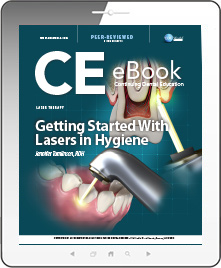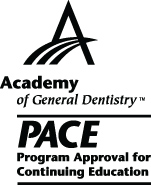CDEWorld > eBooks > Getting Started With Lasers in Hygiene


ADA CERP is a service of the American Dental Association to assist dental professionals in identifying quality providers of continuing dental education. ADA CERP does not approve or endorse individual courses or instructors, nor does it imply acceptance of credit house by boards of dentistry. Concerns or complaints about a CE provider may be directed to the provider or to ADA CERP at www.ada.org/cerp/

Approved PACE Program Provider. FAGD/MAGD credit. Approval does not imply acceptance by a state or provincial board of dentistry, or AGD endorsement. 1/1/2023 to 12/31/2028. ID # 209722.
eBook
Released: Tuesday, April 23, 2019
Expires: Saturday, April 30, 2022
Getting Started With Lasers in Hygiene
By Jennifer Tumlinson, RDH
Commercial Supporter: PDS University — Institute of Dentistry
Lasers are an emerging medical technology. In dentistry, they provide enhanced treatment options through advanced capabilities, especially in regard to management of periodontal disease. Diode lasers can be used as an adjunct to scaling and root planing. Thus, lasers fit well in a hygiene protocol. Basic knowledge of laser science topics, including possible bactericidal effects and healing properties, is necessary to understand the impact of laser technology in dentistry. Implementing lasers in the dental practice can lead to happier and healthier patients. The author concludes that clinicians can effectively incorporate laser use into their office procedures by conceptualizing important factors such as the oral-systemic impact of periodontal disease and laser-tissue interaction.
LEARNING OBJECTIVES:
-
Discuss the basic principles of the science and technology of lasers.
-
Discuss the healing properties and bactericidal effects of soft-tissue diode lasers.
-
Discuss the use of lasers as an adjunct to scaling and root planing.
About the Author
Jennifer Tumlinson, RDH
Pacific Dental Services practice, Katy, Texas


